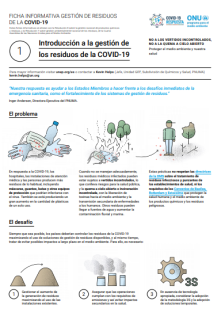
With the COVID-19 pandemic continuing to spread and its impacts upon human health and the economy intensifying day-by-day, governments are urged to treat waste management, including of medical, household, and other hazardous waste, as an urgent and essential public service in order to minimise possible secondary impacts upon health and the environment.
During such an outbreak, many types of additional medical and hazardous waste are generated, including infected masks, gloves, and other protective equipment, together with a higher volumes of non-infected items. Unsound management of this waste could cause unforeseen effects on human health and the environment. The safe handling and final disposal of this waste is, therefore, a vital element in an effective emergency response.
This series of factsheets from UNEP provides guidelines on how to deal with COVID-19 related wastes and provides information needed to assess the problem.
- Introduction to COVID-19 waste management
- National medical waste capacity assessment
- How to choose your waste management technology to treat COVID-19 waste
- Policy and legislation linked to COVID-19 and pandemics
- Links to Circularity - Non-healthcare waste
- Linkages of air quality and COVID-19
- Household medical waste management
- Disaster/Conflict Affected States and Vulnerable Humanitarian Operations
- COVID-19, wastewater, and sanitation
